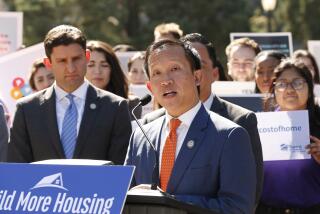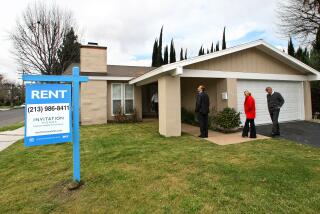Airbnb, HomeAway settle rental-registration lawsuit against San Francisco

- Share via
San Francisco has reached an agreement with Airbnb and HomeAway to settle a federal lawsuit and allow short-term rentals to operate in the city while complying with local regulations.
The agreement, which must still be approved by the San Francisco Board of Supervisors, addresses concerns by short-term rental platforms about being responsible for ensuring that all participating landlords register with the city and comply with local regulations.
Chris Lehane, head of global policy and communication for Airbnb, called the deal “a proverbial ‘winner, winner chicken dinner’” during a news conference Monday.
The lawsuit filed by Airbnb last year challenged a city ordinance that would fine short-term rental platforms $1,000 for each user who rents out property on such sites without registering with the city.
Under the agreement, Airbnb and HomeAway will create systems that give San Francisco information about users when they register to list rentals on the online platforms. Based on that information, the city will be able to determine if users are registered with the city and abiding by regulations such as a rule that prohibits the use of affordable housing units for short-term rentals.
Creating and rolling out the system will take about eight months, Airbnb said.
Airbnb will deactivate listings if the city notifies Airbnb and HomeAway of a property that has failed to register.
“We need to protect our neighborhoods,” City Atty. Dennis Herrera said. “While we are happy to see a homegrown San Francisco company like Airbnb succeed, it can’t be at the expense of residents.”
Housing advocates have complained that Airbnb and other short-term rental sites encourage landlords to rent to travelers, which reduces rentals available for local residents.
“For those who have been turning badly needed rent-controlled units into vacation spots, that is coming to an end once and for all,” Herrera said in a statement.
Users and other proponents of short-term rentals say they help boost local economies, generate taxes and allow owners to afford to live in San Francisco and other high-cost areas. Lehane said the average Airbnb host generates about $6,000 a year.
In San Francisco, 2,100 short-term rental properties have been registered with the city, but Airbnb alone has more than 8,000 short-term listings in San Francisco.
Airbnb and HomeAway have vowed to deactivate any listing once the city notifies the short-term rental platforms that a property is not registered with the city.
“HomeAway is pleased to have reached an agreement with the city to create a more convenient means for owners to comply with local rules,” said Philip Minardi, director of policy communications for HomeAway.com.
Lehane noted repeatedly that the only information shared by Airbnb with the city will be the name, address and ZIP Code of the property that is registered on the site. He said he is not sure how many current Airbnb hosts may stop using the site once their information gets passed on to the city, but he added that similar systems have been adopted successfully in Denver, Chicago and New Orleans.
ALSO
Mnuchin defends proposal to eliminate tax deduction that benefits Californians
Fox News co-president Bill Shine resigns amid criticism of his handling of sexual harassment claims
Tribune Media’s shares jump 6% on reports Fox and Blackstone want to buy it
UPDATES:
2:15 p.m.: This article was updated with additional analysis as well as comments from Dennis Herrera, San Francisco city attorney; Chris Lehane, head of global policy and communication for Airbnb; and Philip Minardi, director of policy communications for HomeAway.com.
This article was originally published at 11:55 a.m.
More to Read
Inside the business of entertainment
The Wide Shot brings you news, analysis and insights on everything from streaming wars to production — and what it all means for the future.
You may occasionally receive promotional content from the Los Angeles Times.











